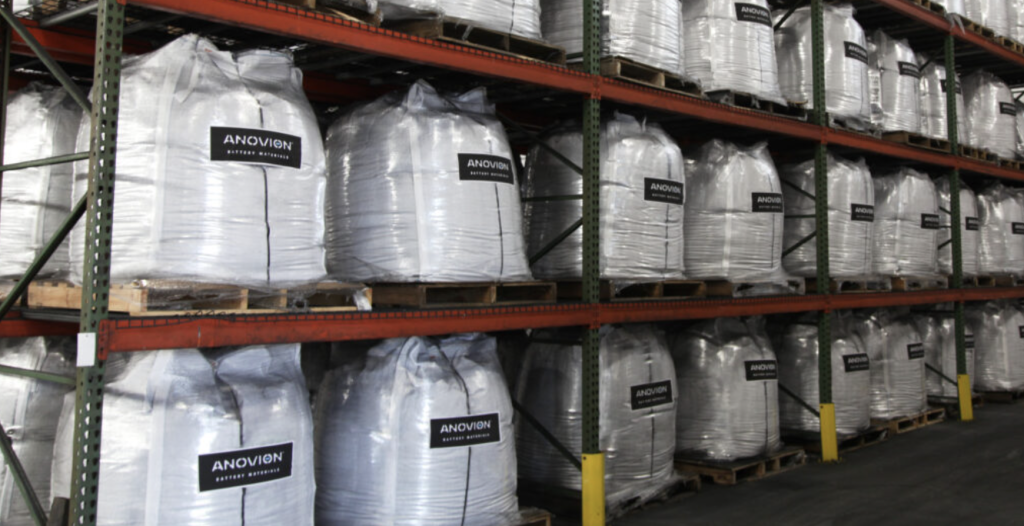Alabama to use infrastructure funds for broadband, airport upgrades
Published 1:14 pm Wednesday, November 1, 2023

- The new Anovion LLC facility slated for north Alabama plans to produce 35,000 tons of new synthetic graphite anode material capacity for lithium-ion batteries used in electric vehicles and critical energy storage applications. Courtesy | Anovion Technology
Plans for using the approximately $7 billion Alabama is expected to receive from the Infrastructure Investment and Jobs Act are taking shape.
About $5.8 billion will fund highways and bridges across the state over the next five years.
The Act, also known as the Bipartisan Infrastructure Law, and passed in late 2021 will mean $1.4 billion for broadband expansion through the Broadband Equity, Access and Deployment Program.
About 377,000 households in Alabama are enrolled in the federal Affordable Connectivity Program, made possible by the law.
“In our 21st-century economy, access to reliable high-speed internet is not a luxury. It is a necessity,” said Democratic U.S. Rep Terri Sewell, the only Alabama member of Congress to vote in favor of the Bipartisan Infrastructure Law. “These funds will be a game-changer for our state.”
According to Sewell’s office, as of 2021, 18% of Alabama households did not have an internet subscription, and 11.5% of Alabama residents lived in areas where there was no broadband infrastructure.
Through early September, $4.6 billion in Bipartisan Infrastructure Law funding had been announced and is headed to Alabama with more than 211 specific projects identified for funding through available grants and matching funds.
The Infrastructure Investment and Jobs Act passed the U.S. Senate by a bipartisan vote of 69-30 in August 2021, followed in November of that year with passage in the U.S. House on a vote of 228-206.
The votes in Alabama were along party lines. Republicans afterward blamed Democrats for pushing the bill through.
“I fully support funding for infrastructure that is focused on national priorities rather than wasting hundreds of billions of dollars on a Green New Deal wish list and programs under the guise of human infrastructure that simply expand government control of our lives,” Republican U.S. Rep. Gary Palmer said at the time.
Highways and bridges
Since the infrastructure law passed, approximately $2.7 billion in projects has been announced for transportation to invest in roads, bridges, public transit and ports. Of that, $140 million is slated for airport development.
Alabama has received approximately $69.6 million in 2022 and 2023 for airports.
For example, Cullman County Regional Airport in north Alabama will receive nearly $600,000 to move forward with a planned taxiway for the property.
The airport’s director, Ben Harrison, said other needed upgrades to the runway, existing taxiways and regular maintenance delayed plans for the new taxiway, or path that aircraft travel along to or from a runway.
“It was lower down the list, but now we’ve been able to bring our list forward by several years with this BIL funding,” Harrison said. “We have a long-term development plan, and this BIL allows us to kick that a little bit further, and to kind of kick that in gear and get that plan going.”
Once the new taxiway is complete, leftover infrastructure funds are to be used to develop pads for hangars or buildings that store aircraft. Currently, there are nearly 90 aircraft housed at the Cullman airport, with a waiting list of approximately 45 aircraft. The airport sees approximately 25,000 to 30,000 operations per year, Harrison said.
“Every industry in this community uses the airport, and that’s whether it brings in supplies or brings in their suppliers, or brings in cargo, the CEOs of corporations or CEOs of corporations looking to do business with these people,” Harrison said. “Without the airport, having the ability to help industries grow, they’re not going to locate here.
“An airport is not going to guarantee you a project, but unless you have an airport, it’ll be the first thing that kicks them out.”
Other plans
Other infrastructure funding updates and highlights for Alabama, per the White House:
• Roughly $782 million through five years has been awarded for Alabama to improve water infrastructure. About $295 million of that has been announced for clean water initiatives through the Environmental Protection Agency. Also, $89.8 million is dedicated to lead pipe and service line replacement, with another $76 million for safe drinking water investments that can also support lead pipe replacement.
• Alabama is expected to receive approximately $402 million through five years to improve public transit across the state.
• Schools in Alabama have been awarded $20.5 million through the EPA’s Clean School Bus Program. Several communities in Alabama were awarded $29.7 million for clean transit buses and improved bus service.
• The state could receive roughly $79 million in formula funding throughout five years to support the expansion of electric vehicle charging in the state. To date, Alabama has been allocated $28.6 million to build a network of EV chargers across the state.
• Of the approximately $92 million allocated to Alabama so far for clean energy, energy efficiency and power in 2022 and 2023, $47.5 million is for weatherization and $13.5 million is to prevent outages and make the power grid more resilient.
• Alabama has received about $66.5 million in 2022 and 2023 for ports and waterways infrastructure to strengthen the state’s supply chains, address maintenance backlogs and reduce congestion and emissions near ports.
• To date, approximately $89.9 million has been allocated to Alabama to prepare the state for the impacts of climate change, extreme weather events and other hazards such as cyberattacks.
• To date, approximately $45.9 million has been allocated to Alabama in 2022 and 2023 for capping orphaned oil and gas wells and reclaiming abandoned mine lands, and $2.2 million has been allocated to cleaning up brownfield sites.

